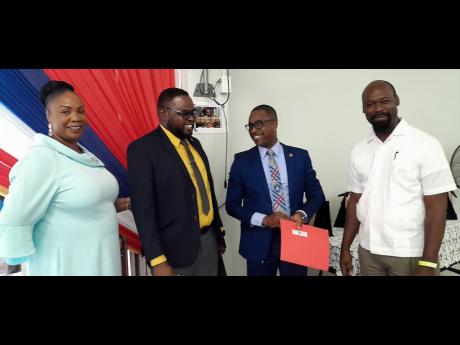Math teachers challenged to embrace learning styles
Educator says it’s part of demystifying complexities in teaching
WESTERN BUREAU:
A JAMAICAN educator based in New York, Dr Beverly Jones, has challenged mathematics educators to change their ways of teaching by embracing the methods of how students learn.
Jones, assistant superintendent for secondary curriculum instruction and school improvement for the Mount Vernon School District in the United States, said that while math is often considered the most difficult subject to be taught in Jamaican schools - with consistently low passes - there’s no mystery to the subject.
“If a child can’t learn the way you teach, for heaven’s sake, just teach them the way they learn,” Jones told over 200 educators who attended the second annual Sharp Mathematics Conference at Sam Sharpe Teachers’ College (SSTC) in Montego Bay recently.
The maths conference was being held under the theme ‘Demystifying the Complexities: Teach Me the Way I Learn’ on Wednesday, November 15.
Jones urged her audience to cultivate research- and data-driven decision-making for evidence-based strategies for teaching math.
She noted that purposeful, intentional planning is needed to change the way they teach, and that students should be allowed to explore and speak while being active.
Given that math is a scientific subject, Jones also encouraged teachers to make use of technology, as their teaching methods should be relevant.
“Artificial intelligence (AI) is going to be an amazing opportunity to bring mathematics and AI together, but it has to be understood that it has to be used in a way that will create an impact on how students learn,” Jones said, noting that it had to make them better thinkers and problem-solvers, because it’s the world in which they are growing up.
Declaring that the teaching of mathematics was simple, Jones said her biggest problem was having teachers teach in the way they learnt in Noah’s Ark days and not being aware that their students know way more than they are giving them credit for.
She added that it is very likely that many of those who attended the conference believed they were bad at math, because somebody forced them to learn the way they had learnt.
Dr Lois George, senior lecturer at The University of the West Indies, Mona, who shared on the topic of ‘Mathematics’ Failure’, agreed that there is a need to facilitate students’ learning patterns.
“We need to be moving to a place where we allow our students to create their own, while creating a different situation for them to learn,” she said.
She questioned how teachers could be teaching what they themselves did not understand, and underscored the importance of STEM (science, technology, engineering and mathematics) in the educational system.
“Mathematics is really an interesting subject because in the STEM arena, it underpins every other subject and discipline. You can’t say that about science necessarily,” she said, emphasising that math is cross-cutting every single STEM discipline, especially through reasoning and critical thinking.
Ricardo Bennett, principal of SSTC, said his institution will continue to lead the evolution of mathematics education.
“We stand at the forefront of (this) dynamic discussion on the evolution of mathematics education in an era defined by rapid technological movements, particularly with the integration of artificial intelligence,” he noted.
Describing the conference as a beacon of educational innovation, Bennett said that the demystifying of the complexities reflects a collective endeavour to make mathematics more relatable, breaking down barriers and illuminating pathways for students’ understanding.
“‘Teach me the way I learn’ championed the adaptation of teaching methodologies to diverse individual learning styles and emphasised the need for [a] personalised student-centred approach,” Bennett said.

